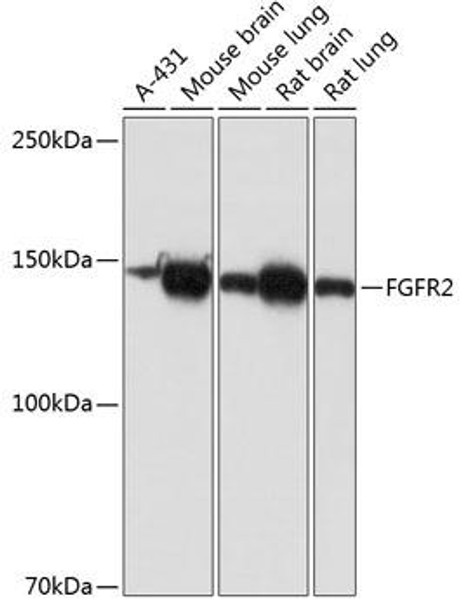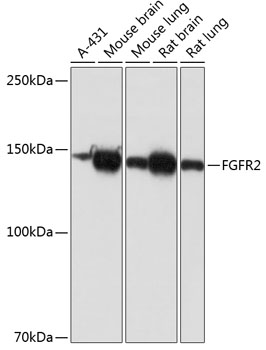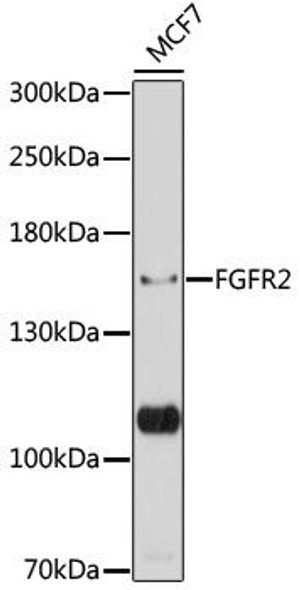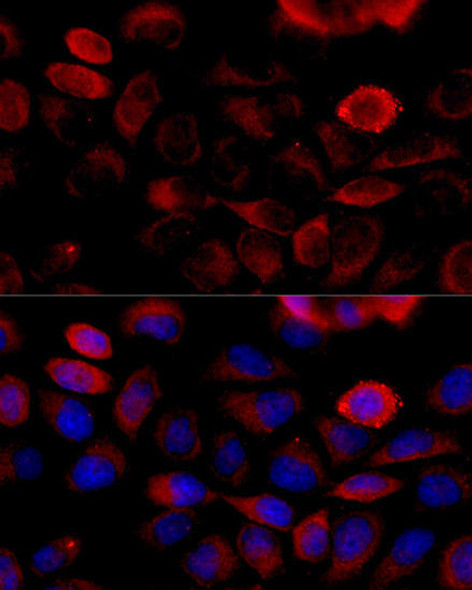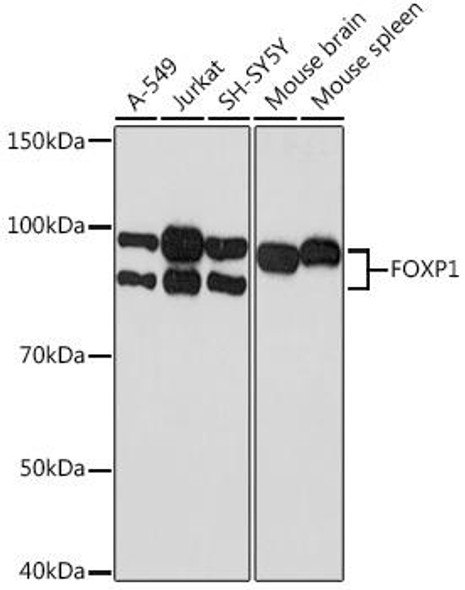Description
FGFR2 Rabbit Monoclonal Antibody (CAB19051)
The FGFR2 Rabbit Monoclonal Antibody (CAB19051) is a cutting-edge tool designed for research involving the Fibroblast Growth Factor Receptor 2 (FGFR2), a key player in cell growth and differentiation. This antibody, produced using rabbit monoclonal technology, offers high specificity and sensitivity for detection of FGFR2 in human samples, making it an ideal choice for experiments in cancer biology and developmental biology.FGFR2 is a transmembrane receptor tyrosine kinase that plays a crucial role in cell proliferation and tissue repair. Dysregulation of FGFR2 has been implicated in various cancers, making it a promising therapeutic target for cancer treatment.
This antibody binds specifically to the FGFR2 protein, allowing for accurate detection and quantification in a variety of cell types and tissues, providing valuable insights into its role in both normal and disease states.By using the FGFR2 Rabbit Monoclonal Antibody (CAB19051), researchers can further explore the molecular mechanisms underlying FGFR2 signaling, potentially leading to the development of targeted therapies for a wide range of diseases. Its versatility and reliability in Western blot applications make it a valuable tool for advancing our understanding of FGFR2 biology and its implications in human health.
| Product Name: | FGFR2 Rabbit Monoclonal Antibody |
| SKU: | CAB19051 |
| Size: | 20uL, 100uL |
| Isotype: | IgG |
| Host Species: | Rabbit |
| Reactivity: | Human,Mouse,Rat |
| Immunogen: | A synthetic peptide corresponding to a sequence within amino acids 1-100 of human FGFR2 (P21802). |
| Sequence: | MVSW GRFI CLVV VTMA TLSL ARPS FSLV EDTT LEPE EPPT KYQI SQPE VYVA APGE SLEV RCLL KDAA VISW TKDG VHLG PNNR TVLI GEYL QIKG ATPR |
| Tested Applications: | WB ELISA |
| Recommended Dilution: | WB,1:500 - 1:1000 |
| Synonyms: | BEK; JWS; BBDS; CEK3; CFD1; ECT1; KGFR; TK14; TK25; BFR-1; CD332; K-SAM; R2 |
| Positive Sample: | 293T,A-431,Mouse brain,Mouse lung,Rat brain,Rat lung |
| Conjugate: | Unconjugated |
| Cellular Localization: | Cell membrane, Cytoplasmic vesicle, Golgi apparatus, Secreted, Single-pass type I membrane protein. |
| Calculated MW: | 92kDa |
| Observed MW: | 145kDa |
The protein encoded by this gene is a member of the fibroblast growth factor receptor family, where amino acid sequence is highly conserved between members and throughout evolution. FGFR family members differ from one another in their ligand affinities and tissue distribution. A full-length representative protein consists of an extracellular region, composed of three immunoglobulin-like domains, a single hydrophobic membrane-spanning segment and a cytoplasmic tyrosine kinase domain. The extracellular portion of the protein interacts with fibroblast growth factors, setting in motion a cascade of downstream signals, ultimately influencing mitogenesis and differentiation. This particular family member is a high-affinity receptor for acidic, basic and/or keratinocyte growth factor, depending on the isoform. Mutations in this gene are associated with Crouzon syndrome, Pfeiffer syndrome, Craniosynostosis, Apert syndrome, Jackson-Weiss syndrome, Beare-Stevenson cutis gyrata syndrome, Saethre-Chotzen syndrome, and syndromic craniosynostosis. Multiple alternatively spliced transcript variants encoding different isoforms have been noted for this gene.
| Purification Method: | Affinity purification |
| Gene ID: | 2263 |
| Clone Number: | ARC0480 |
| Storage Buffer: | Store at -20℃. Avoid freeze / thaw cycles.Buffer: PBS with 0.02% sodium azide,0.05% BSA,50% glycerol,pH7.3. |

